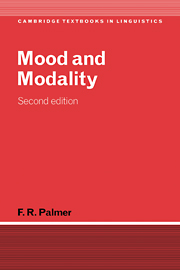Book contents
- Frontmatter
- Contents
- Preface
- Note on the text
- List of abbreviations
- 1 Introduction
- 2 Modal systems: Propositional modality
- 3 Modal systems: Event modality
- 4 Modal systems and modal verbs
- 5 Indicative and subjunctive
- 6 Realis and Irrealis
- 7 Subjunctive and irrealis
- 8 Past tense as modal
- References
- Language index
- General index
2 - Modal systems: Propositional modality
Published online by Cambridge University Press: 05 June 2012
- Frontmatter
- Contents
- Preface
- Note on the text
- List of abbreviations
- 1 Introduction
- 2 Modal systems: Propositional modality
- 3 Modal systems: Event modality
- 4 Modal systems and modal verbs
- 5 Indicative and subjunctive
- 6 Realis and Irrealis
- 7 Subjunctive and irrealis
- 8 Past tense as modal
- References
- Language index
- General index
Summary
As was suggested in 1.2.2, epistemic modality and evidential modality are concerned with the speaker's attitude to the truth-value or factual status of the proposition and may thus be described as ‘propositional modality’. The basic difference between epistemic modality and evidential modality is that with epistemic modality speakers make judgments about the factual status of the proposition, whereas with evidential modality they indicate what is the evidence that they have for it.
However, as was noted in 1.3.1, there are two respects in which epistemic and evidential systems are, in practice, not always wholly distinct. First, the category Deductive, which involves both a judgment and evidence, may occur in both types of systems, and this is true also, though less commonly, of other categories (e.g., Assumptive in Tuyuca – see 2.1.3). It would not be helpful to deal with these twice, once in a section on epistemic modality and once in a section on evidential modality and, for that reason, they will be considered in the section on epistemic modality (2.1). The section on evidential modality (2.2) will deal with purely evidential features, most importantly with Reported and Sensory. Secondly, evidential categories sometimes occur within what are primarily epistemic (judgment) systems (e.g., the uses of sollen and wollen in German that were exemplified in 1.3.1), but these can still be considered in the section on evidentials (2.2.2).
Later sections deal with what seem to be other types of propositional modality.
- Type
- Chapter
- Information
- Mood and Modality , pp. 24 - 69Publisher: Cambridge University PressPrint publication year: 2001



